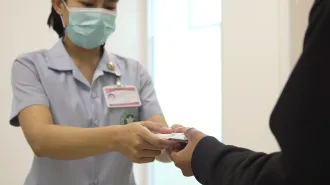How two coronavirus drugs for cats might help humans fight COVID-19
Preliminary studies suggest treatments meant for felines may hold promise

Preliminary studies suggest that two drugs that can treat an almost always fatal coronavirus disease in cats might also be effective against the human coronavirus responsible for the pandemic.
Paul Hanaoka/Unsplash
- More than 2 years ago
In the rush to find drugs against COVID-19, researchers are exploring myriad possibilities, even drugs used to save feline lives.
Cats can contract an almost always fatal disease that’s caused by a coronavirus that infects only felines. Now preliminary research suggests that two experimental drugs that can cure that disease in cats, called feline infectious peritonitis, might help treat people infected with SARS-CoV-2, the coronavirus behind the pandemic.
In lab experiments, one of the drugs, called GC376, disables a key enzyme that some coronaviruses, including SARS-CoV-2, use to replicate. The other, called GS-441524, is an antiviral cousin of remdesivir, the first drug found to speed people’s recovery from SARS-CoV-2 in clinical trials (SN: 4/29/20).
“Both drugs have been highly effective in curing cats with feline infectious peritonitis, and usually without any other form of treatment,” says Niels Pedersen, a veterinarian who studies the feline coronavirus at the University of California, Davis. Neither drug, however, has yet been approved by the U.S. Food and Drug Administration for use in cats, much less humans.
While most animals with feline infectious peritonitis don’t show symptoms, some cats can develop severe illness if the virus mutates to infect a specific type of immune cell. When that happens, the coronavirus spreads throughout the cat’s body, sparking a deadly inflammatory reaction that can cause paralysis or fluid to accumulate in the lungs.
In that way, the cat coronavirus is similar to SARS-CoV-2. Both severe COVID-19 in people and feline infectious peritonitis cases are driven by a dysfunctional inflammatory immune response, says Julie Levy, a veterinarian at the University of Florida in Gainesville.
GC376 works by preventing a key enzyme called M protease, which is found in a number of different coronaviruses, from chopping up long strings of viral proteins. RNA viruses like SARS-CoV-2 often make such protein strings that protease enzymes snip into smaller pieces that then help the virus make more of itself in a cell (SN: 3/10/20). Hindering the protease’s ability to cut can halt viral replication.
In a 2016 study, six of eight cats recovered from an infection with the deadly form of the feline coronavirus after treatment with the drug, Pedersen and colleagues reported in PLOS Pathogens. The two cats that died were among four that had developed severe symptoms, such as jaundice and high fever. But those cats may have suffered from complications of a separate drug they were given to alleviate the disease, the team wrote.
The study also reported that in a test tube, GC376 can stop other coronaviruses besides the feline one. The drug, for example, inhibits proteases from two other viruses that have caused severe outbreaks in people: the SARS coronavirus that sickened people in 2002 and 2003 and the Middle Eastern Respiratory Syndrome, or MERS, coronavirus (SN: 4/23/03; SN: 2/27/13).

Trustworthy journalism comes at a price.
Scientists and journalists share a core belief in questioning, observing and verifying to reach the truth. Science News reports on crucial research and discovery across science disciplines. We need your financial support to make it happen – every contribution makes a difference.
Researchers including Jun Wang, a chemist who studies antiviral drug development at the University of Arizona in Tucson, have found that GC376 can stop the SARS-CoV-2 protease from working in a test tube. Wang, who reported those results June 15 in Cell Research, says his team is now testing the compound in mice. And in results presented August 4 at the virtual American Crystallographic Association meeting, biochemist Joanne Lemieux and colleagues revealed that GC376 not only inhibits the SARS-CoV-2 enzyme in a test tube, but can also hinder viral replication in lab-grown monkey cells. Those results were also posted May 5 at bioRxiv.org.
Based on those findings — and the fact that the drug is safe and effective in cats — the company that makes GC376, Anivive Lifesciences, based in Long Beach, Calif., is now working to move forward with clinical trials in people, says Lemieux, of the University of Alberta in Edmonton, Canada.
“The fact that this drug has already been developed and shown to be successful in treating feline infectious peritonitis, it really bodes well,” Lemieux says.
The other cat drug, GS-441524, that has been effective against the feline coronavirus is similar to remdesivir. The compounds have a similar chemical structure, though remdesivir has an additional part that better helps it get into cells.
Both remdesivir and GS-441524, drugs developed by the biopharmaceutical company Gilead Sciences, based in Foster City, Calif., mimic a building block of the genetic molecule RNA, which makes up the coronavirus’s genetic material. As the virus replicates, it incorporates the copycat building block into its RNA, which prevents viral enzymes from adding more building blocks, stopping replication (SN: 7/13/20).
Pedersen and his colleagues reported that GS-441524 is an effective treatment for feline infectious peritonitis in June 2018 in Veterinary Microbiology. The drug not only inhibited viral replication in lab-grown cells, but also successfully treated 10 out of 10 coronavirus-infected cats that developed severe disease. In a separate February 2019 study in the Journal of Feline Medicine and Surgery, 25 of 26 cats treated with the drug for at least 12 weeks survived.
There is also some evidence hinting that GS-441524 could help people with COVID-19, too. A July 21 study in Cell Reports found that the drug can inhibit SARS-CoV-2 replication in lab-grown monkey and human cells. Remdesivir, however, was more potent in human lung cells, while GS-441524 was more potent in the monkey cells.
Despite such promising results in cats, the drug isn’t legally available for use in those animals. And by focusing instead on remdesivir, which is a complex molecule that is more difficult to make, critics say the company is focusing on a potentially more lucrative drug and so putting its profits ahead of public health. Gilead didn’t respond to questions from Science News about licensing GS-441524. But the company has noted that it was in a position to move quickly with remdesivir because the drug had already cleared human safety trials.
That drug was tested in people with Ebola during the 2014–2016 outbreak in West Africa and the 2018–2020 outbreak in the Congo. While it wasn’t effective against Ebola, knowing it wouldn’t harm patients allowed Gilead to leapfrog the process and begin testing it against SARS-CoV-2. It’s now in COVID-19 clinical trials, some of which have shown that the drug can speed patient recovery. Gilead applied for FDA approval for remdesivir on August 10.
GS-441524, on the other hand, has never been injected into people. And while scientists can make assumptions about safety from animal studies, having human data for GS-441524 is, of course, still important, cautions E. Susan Amirian, a molecular epidemiologist at Rice University in Houston.
Gilead has begun preclinical studies to compare both drugs, according to company spokesperson Chris Ridley.
While it remains to be seen if either GS-441524 or GC376 will work against SARS-CoV-2 in people, the drugs are an example of how understanding the connections between animal and human health can help tackle new viruses. “Partly because of feline infectious peritonitis research, a lot of veterinarians seemed to realize early in the course of the COVID-19 pandemic that remdesivir could be a promising candidate,” Amirian says. “Parallels between human and veterinary medicine are fascinating.”







